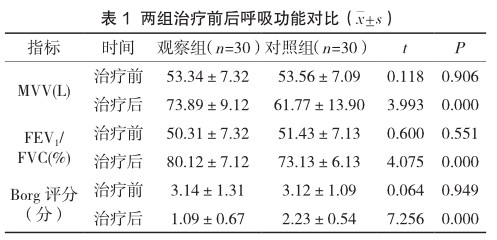体外膈肌起搏联合呼吸训练在脑卒中后呼吸肌疲劳患者肺康复中的临床效果分析


打开文本图片集
【摘要】目的:探寻促进脑卒中后呼吸肌疲劳患者肺康复的高效方案。方法:以60例脑卒中患者为研究对象,按随机原则分为两组,分别命名为观察组和对照组,各30例。对照组给予常规治疗与呼吸训练,观察组基于对照组治疗措施进行体外膈肌起搏,对比两组治疗前后呼吸功能相关指标。结果:治疗后,观察组FEV1/FVC及MVV水平明显高于对照组,Borg评分低于对照组(P
【关键词】脑卒中;呼吸肌疲劳;肺康复;体外膈肌起搏
Analysis of the clinical effect of extracorporeal diaphragmatic pacing combined with respiratory training in pulmonary rehabilitation of patients with respiratory muscle fatigue after stroke
TANG Jing
Karamay Second People’s Hospital (Rehabilitation Hospital), Karamay, Xinjiang 834000, China
【Abstract】Objective:To explore the efficient programs to promote pulmonary rehabilitation in patients with respiratory muscle fatigue after stroke.Methods:60 stroke patients were randomly divided into two groups,named the observation group and the control group,with 30 cases in each group.The control group received conventional treatment and respiratory training,and the observation group performed extracorporeal diaphragmatic pacing based on the treatment measures of the control group,comparing the respiratory function related indicators before and after treatment between the two groups.Results:After treatment,the levels of FEV1/FVC and MVV in the observation group were significantly higher than those in the control group,and the Borg score was lower than that in the control group(P
【Key Words】Stroke; Respiratory muscle fatigue; Pulmonary rehabilitation; Extracorporeal diaphragmatic pacing
卒中后疲劳是脑卒中后的常见并发症,是生理和心理因素共同作用的结果,与年龄、神经功能缺损、焦虑、抑郁、睡眠障碍、吸烟、肺部并发症等多因素相关[1]。(剩余4423字)